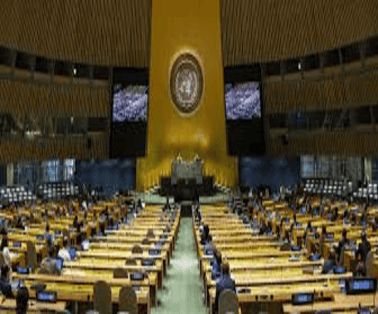India’s External affairs minister addressed the 78th session of the United Nations General Assembly (UNGA).
Key Highlights from India’s Address at the United Nations General Assembly (UNGA):
- The theme of the 78th session of UNGA is “Rebuilding trust and reigniting global solidarity: Accelerating action on the 2030 Agenda and its Sustainable Development Goals towards peace, prosperity, progress and the sustainability for all.”
- The events started on 5th September till 23rd September 2023.
- Dennis Francis was the President of the 78th Session of the UN General Assembly
- The Assembly’s annual general debate provides Member States the opportunity to express their views on major international issues.
- On this occasion, the Secretary-General presents on the opening day of the debate his report on the work of the Organization.
India’s Focus at the UNGA
- Jaishankar emphasized the need for a fair, equitable, and democratic international order
- He highlighted the significance of India’s G20 presidency and its focus on the concerns of the most vulnerable, including the African Union’s inclusion as a permanent member.
- Jaishankar emphasized India’s ability to engage with a broad range of nations and harmonize interests, citing examples like the QUAD and BRICS.
- Jaishankar stressed that political convenience should not determine responses to terrorism, extremism, and violence
- He called for the United Nations to make the Security Council contemporary, inspired by the African Union’s inclusion in the G20
- Jaishankar highlighted the need to move away from a system where a few nations set the global agenda, emphasizing that such days are over.
- He mentioned India’s commitment to gender equality, referring to the path-breaking legislation to reserve one-third of seats for women in legislatures.
- Jaishankar called for stringent climate action and criticized practices like vaccine apartheid
- He shared India’s message of digitally enabled governance and infrastructural growth, showcasing the nation’s vibrant start-up ecosystem.
- In his address, Jaishankar conveyed India’s commitment to fostering cooperation, addressing global challenges, and contributing to a more equitable and just world order.
About the United Nations General Assembly (UNGA)
- The General Assembly is the main deliberative, policymaking and representative organ of the UN.
- It was established in 1945 under the Charter of the United Nations and is headquartered in New York City.
- It is one of the six principal organs of the UN and serves as the main policy-making organ of the Organization.
- All 193 Member States of the UN are represented in the General Assembly, making it the only UN body with universal representation.
- The President of the General Assembly is elected each year by assembly to serve a one-year term of office.
- The presidency rotates annually between the five geographic groups: African, Asia-Pacific, Eastern European, Latin American and Caribbean, and Western European and other States.
Decision-Making Process at the UNGA
- Decisions on important questions, such as those on peace and security, admission of new members and budgetary matters, require a two-thirds majority of the General Assembly.
- Decisions on other questions are by simple majority.
- The Assembly has no binding votes or veto powers like the UN Security Council.
Key Functions of the UNGA as per the UN Charter:
- Consider and approve the United Nations budget and establish the financial assessments of Member States.
- Elect the non-permanent members of the Security Council and the members of other United Nations councils and organs and, on the recommendation of the Security Council, appoint the Secretary-General.
- Consider and make recommendations on the general principles of cooperation for maintaining international peace and security, including disarmament.
- Discuss any question relating to international peace and security and, except where a dispute or situation is currently being discussed by the Security Council, make recommendations on it.
Main Committees of the UNGA
The six main Committees of UNGA are:
- the Disarmament and International Security Committee
- the Economic and Financial Committee
- the Social, Humanitarian and Cultural Committee
- the Special Political and Decolonization Committee
- the Administrative and Budgetary Committee
- the Legal Committee
To Download Monthly Current Affairs PDF Click here
Click here to get a free demo
Everything About CLAT 2026



